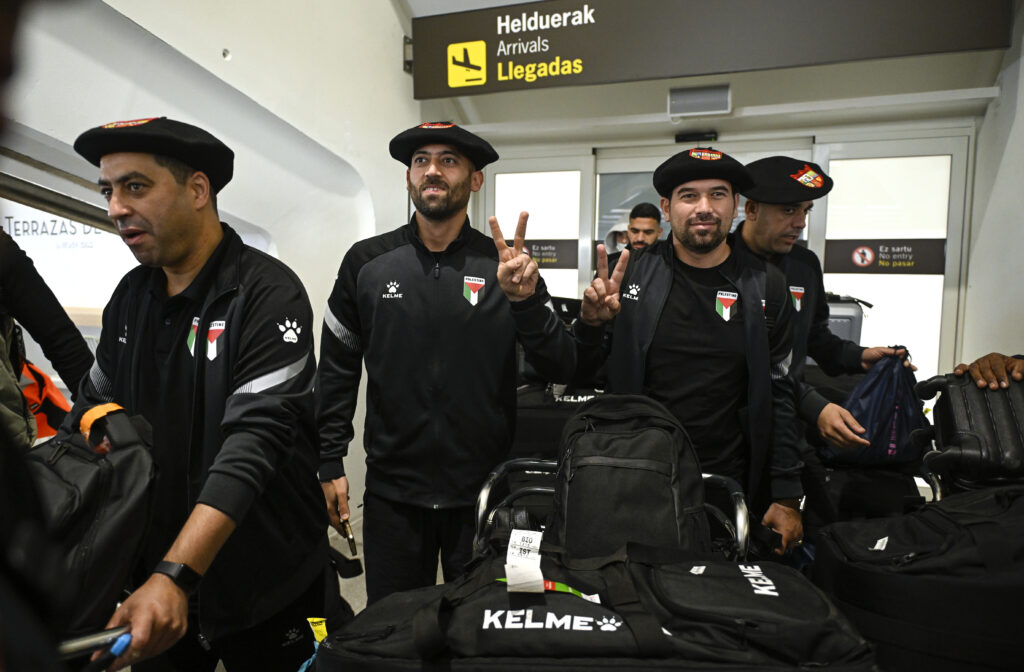AFP Asia Business
Palestinian national team on ‘mission’ for peace in Spain visit
On a “mission” in Spain, Palestinian national team coach Ehab Abu Jazar and his players will play symbolic friendlies against the Basque Country and Catalan national teams in the hopes of working towards safety and freedom for their people.Dressed in a black tracksuit, whistle in mouth, Palestinian coach Abu Jazar leads the team’s training session with authority at Lezama, Athletic Bilbao’s training ground on Friday.On one of the pitches offered by the top-flight club he tries to prepare his players as best he can for what will be much more than just a match at the grand San Mames stadium, in front of 50,000 spectators supporting the Palestinian cause on Saturday.As seen during the pro-Palestinian protests that heavily affected cycling’s Vuelta a Espana Grand Tour this summer, there is heavy support for them in the region as they play their first match in Europe.They are 98th in the FIFA rankings, and their dream of playing in their first World Cup vanished this summer in the third round of the Asian qualifiers.Abu Jazar has lost many family members to the Israel-Hamas war and some of his relatives are still at risk, a situation always present in his thoughts.”I am from the Gaza Strip, from a large family in the Gaza Strip. We have almost 200 martyrs from the family. My own house was destroyed in this war,” he tells AFP.”My relatives, my mother until today is still living in a tent along with my brothers, my sisters, my cousins, my neighbours, my friends, and all of Gaza. So, emotionally and psychologically, it is extremely difficult.”Most of his players have never set foot in Gaza. Some play in Qatar, one in Chile, in Iceland, or in the United States.They are the last representatives of Palestinian football, devastated at all levels by two years of Israeli bombardment, described as genocide by the Spanish government, in response to Hamas’s unprecedented cross-border attack on October 7, 2023.Since then, there has been no league, no functioning clubs, and hundreds of athletes have been injured or killed, including the country’s most famous footballer, Suleiman Al-Obeid, 41, nicknamed the “Palestinian Pele”.The Palestine Football Association said he was killed when Israel attacked civilians waiting for humanitarian aid.”We are here on a mission,” says coach Abu Jazar to AFP, adjusting his keffiyeh around his neck.”Our message to the whole world is this — put pressure on this occupation to stop this genocide.” – ‘Death and famine continue’ -Despite the fragile ceasefire which came into place on October 10, the coach highlighted the continuing peril for civilians in Gaza.”Death continues in Gaza to this day, famine continues in the Gaza Strip, and there is no shelter,” said Abu Jazar, after Israel’s relentless bombing razed much of the land.”We are approaching the winter season and the tents do not protect from the cold of winter nor the heat of summer.”So we are telling the entire world — apply as much pressure as you can on this occupation, because in Palestine there is a people who deserve a state and a dignified life.”We want to live with dignity and independence, and this will not happen except with the end of the occupation.”The coach, like his players, hopes this charity match, with proceeds donated to Doctors Without Borders, will help increase the “pressure” on the international community to fight for lasting peace and recognition of a Palestinian state.”This is the most important thing — giving a voice to Palestinians who don’t have one, and raising funds to help humanitarian organisations,” said defender Yasser Hamed, born in Bilbao and trained at Athletic Bilbao.”This money will help a lot, especially in rebuilding hospitals, delivering medicines, etc.”- Hope and resilience -Hamed, who speaks fluent Basque and Spanish, considers himself “lucky” to be able to continue living his passion, “while some Palestinians are starving.””It makes you savour every plate, and all the little things people don’t notice in daily life,” he continued.”We have this responsibility to bring a bit of joy to our compatriots who are suffering. All of this must stop, and Palestine must finally be free.”His teammate Ahmed Al-Qaq, born in the United States to Palestinian parents, hopes these matches can “open the world’s eyes” to the humanitarian situation in Gaza.”We are not politicians, but as players, we give people something to look forward to. Especially with everything they’re going through, it gives them a glimmer of hope,” explains the 23-year-old winger.And if Palestine lose, as they did against Malaysia and Algeria in recent matches?”We’ll recover. It’s in our genes to always get back up when we fall.”

